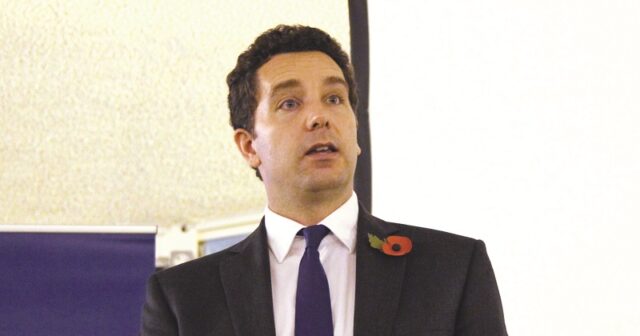Governor boards for reviewing exclusions should be scrapped and replaced with independent “tribunals” of experts, the leading organisation for governance has told ministers.
Governors can feel the pressure not to overturn the headteacher’s decision, particularly where they know staff are stressed and feel they cannot cope with a pupil, according to Emma Knights (pictured), chief executive of the National Governance Association.
“Excluding a pupil is a technical and legal matter, not a governance issue,” she said. “It’s not about the strategic direction of the school so governors shouldn’t be responsible for it.”
The NGA has submitted the proposal to the government’s exclusion review led by former minister Ed Timpson, where it is being analysed with other feedback.
However some critics claim the suggestion undermines trust in governors to do their job properly.

Knights, who tweeted the NGA’s suggestion in a discussion on exclusions this morning, said pupils should be heard by a properly independent “exclusions tribunal” in the same way that teachers who appeal being sacked are heard by an employment tribunal.
“Other sectors don’t have people who also act as appeals bodies for their own institutions. They’d be laughed out of the room.”
At the moment, governors in council-run schools can delegate exclusion decisions to a sub-committee of at least three governors, Department for Education guidance states. A local governing body of an academy can also do this if the trust’s articles of association allow it.
In both academies and maintained schools, the governing board must review permanent exclusions within two weeks.
They must also review fixed-term exclusions if it would result in the pupil missing an important exam or test, or brings the pupil’s total number of days out of school to more than 15 in one term.
Governors must also review a fixed-term exclusion if parents appeal it, within 50 school days after receiving the notice of exclusion.
If parents don’t appeal a suspension, then governors have no power to overrule it.
But Knights said governors should not be involved in reviewing exclusions at any point – appeal or no appeal.
The Department for Education at first told Knights the suggestion to remove governors from exclusion reviews was outside of the review remit led by Timpson. However they then told the NGA to submit the idea as part of their wider proposals.
The review closed its call for evidence in early May. It will focus on how and how often exclusions are used at different schools, with a focus on pupils most likely to be excluded such as certain ethnicities, poorer pupils and those with special educational needs.
We have to accept that governors can hold heads to account and withstand pressures
Mark Lehain, interim director of New Schools Network, asked Knights on Twitter for her evidence for the claim that “governors don’t review exclusions well”.
He said it “sounded like a training issue” that could be resolved.
“We have to accept that governors can hold heads to account and withstand pressures – that’s their job,” said Lehain, adding governors already do this for performance and pay reviews.
“If they can’t do that, do we get rid of them full stop? I doubt you’re advocating that”.
When Schools Week asked Knights whether there are enough experts in local areas to sit on exclusion tribunals, she said the issue must be worked out by ministers.
She recommended looking at best practice in tribunals across other sectors.








In 30 years of being a governor, I have only had to hear one such permanent exclusion appeal. It was fairly straight-forward, a matter of hearing the evidence and examining the school’s records on the case and the school’s capacity to manage the situation. I do not agree that governors should be shut out of these cases but I do believe that it is essential that governors sitting on the panel should be advised by expert officers and that parents who are appealing against exclusion should also have the right of representation.
The governors’ role is to represent the interests of the community and also to monitor management decision making and they cannot do this effectively if exclusion appeals are taken out of their hands.
The NGA do not appear to be properly representing the interests of governance from what I can see.
The hearing is a joke. 3 people who are not experts are expected to decide on something that requires a lot of knowledge. I attended one, completely baised towards the headteacher, even though experts were clearly against her. It’s not clear to me how people with little knowledge can decide on the future of a child. Permanent exclusion is a permanent stain.
Governors panels should be scrapped with immediate effect they are a complete waste of time. My child with SEN was permanently excluded for reasons aggravated by poor support at the school. The headteacher had not followed the school’ behaviour policy and had made the decision not as last resort contrary to the exclusion statutory guidance 2017. The headteacher had not followed this guidance at all, having done things her own way. No exclusion notification for 5 days which made the exclusion unlawful. The governors had no understanding of the restrictions of my son’s disability and were clearly biased towards the head teacher. There was clear evidence that the head teacher exaggerated my son’s actions and did not report things correctly as per witness statements and they still upheld her decision. I saw one of the governors wink at the headteacher when she was explaining the procedure she followed which was unlawful to alert her not to say what she was saying.
The headteacher was protected by the governors through a disproportionate, unfair and unlawful exclusion of a child with SEN who was clearly poorly supported by the school. We had raised our concerns with the headteacher and she had done nothing to help my son.
We spent a whole day at the school only for the governors to uphold an unfair and unlawful decision. They are not experts and should not be placed in that position. Permanent exclusions are damaging to all children and let alone children with SEN. These matters should be heard by independent impartial experts because as we saw at my son’s governors meeting they had already made their decision supporting the headteacher and had no understanding of the impact of the exclusion or SEN on my son.
Scrap these time wasters who are there to defend the headteacher and undermine the child and parent’s rights making decisions on issues they have no clue about. How many governors meeting have resulted in reinstating the child? Probably not many. Do you want to say that the headteacher is always right?
Please scrap the governors meetings and spare parents the injustice and mental anguish these meetings cause.
I am happy to use our case as a case example to show the injustice in the panel meetings. I am suing the school for the injustice and mental anguish and could use all the support out there to get justice.
[…] year Emma Knights, chief executive of the National Governors’ Association, said governors should not be involved in exclusion panels. She suggested they could feel pressured to support a headteacher’s decision, and […]